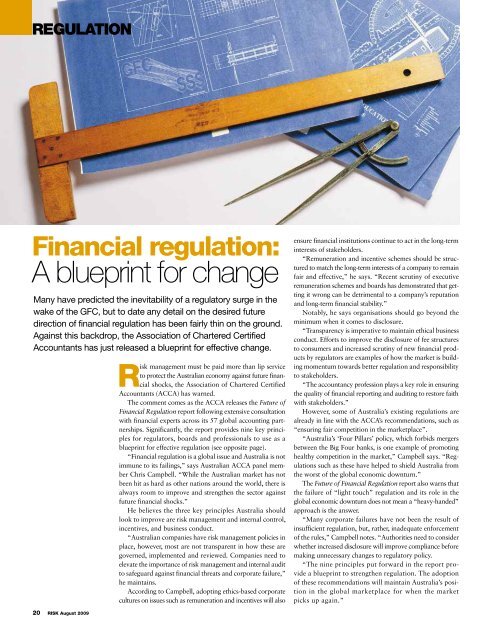MAGAZINE - Realview
MAGAZINE - Realview
MAGAZINE - Realview
Create successful ePaper yourself
Turn your PDF publications into a flip-book with our unique Google optimized e-Paper software.
REGULATION<br />
Financial regulation:<br />
A blueprint for change<br />
Many have predicted the inevitability of a regulatory surge in the<br />
wake of the GFC, but to date any detail on the desired future<br />
direction of financial regulation has been fairly thin on the ground.<br />
Against this backdrop, the Association of Chartered Certified<br />
Accountants has just released a blueprint for effective change.<br />
Risk management must be paid more than lip service<br />
to protect the Australian economy against future financial<br />
shocks, the Association of Chartered Certified<br />
Accountants (ACCA) has warned.<br />
The comment comes as the ACCA releases the Future of<br />
Financial Regulation report following extensive consultation<br />
with financial experts across its 57 global accounting partnerships.<br />
Significantly, the report provides nine key principles<br />
for regulators, boards and professionals to use as a<br />
blueprint for effective regulation (see opposite page).<br />
“Financial regulation is a global issue and Australia is not<br />
immune to its failings,” says Australian ACCA panel member<br />
Chris Campbell. “While the Australian market has not<br />
been hit as hard as other nations around the world, there is<br />
always room to improve and strengthen the sector against<br />
future financial shocks.”<br />
He believes the three key principles Australia should<br />
look to improve are risk management and internal control,<br />
incentives, and business conduct.<br />
“Australian companies have risk management policies in<br />
place, however, most are not transparent in how these are<br />
governed, implemented and reviewed. Companies need to<br />
elevate the importance of risk management and internal audit<br />
to safeguard against financial threats and corporate failure,”<br />
he maintains.<br />
According to Campbell, adopting ethics-based corporate<br />
cultures on issues such as remuneration and incentives will also<br />
ensure financial institutions continue to act in the long-term<br />
interests of stakeholders.<br />
“Remuneration and incentive schemes should be structured<br />
to match the long-term interests of a company to remain<br />
fair and effective,” he says. “Recent scrutiny of executive<br />
remuneration schemes and boards has demonstrated that getting<br />
it wrong can be detrimental to a company’s reputation<br />
and long-term financial stability.”<br />
Notably, he says organisations should go beyond the<br />
minimum when it comes to disclosure.<br />
“Transparency is imperative to maintain ethical business<br />
conduct. Efforts to improve the disclosure of fee structures<br />
to consumers and increased scrutiny of new financial products<br />
by regulators are examples of how the market is building<br />
momentum towards better regulation and responsibility<br />
to stakeholders.<br />
“The accountancy profession plays a key role in ensuring<br />
the quality of financial reporting and auditing to restore faith<br />
with stakeholders.”<br />
However, some of Australia’s existing regulations are<br />
already in line with the ACCA’s recommendations, such as<br />
“ensuring fair competition in the marketplace”.<br />
“Australia’s ‘Four Pillars’ policy, which forbids mergers<br />
between the Big Four banks, is one example of promoting<br />
healthy competition in the market,” Campbell says. “Regulations<br />
such as these have helped to shield Australia from<br />
the worst of the global economic downturn.”<br />
The Future of Financial Regulation report also warns that<br />
the failure of “light touch” regulation and its role in the<br />
global economic downturn does not mean a “heavy-handed”<br />
approach is the answer.<br />
“Many corporate failures have not been the result of<br />
insufficient regulation, but, rather, inadequate enforcement<br />
of the rules,” Campbell notes. “Authorities need to consider<br />
whether increased disclosure will improve compliance before<br />
making unnecessary changes to regulatory policy.<br />
“The nine principles put forward in the report provide<br />
a blueprint to strengthen regulation. The adoption<br />
of these recommendations will maintain Australia’s position<br />
in the global marketplace for when the market<br />
picks up again.”<br />
20 RISK August 2009

















